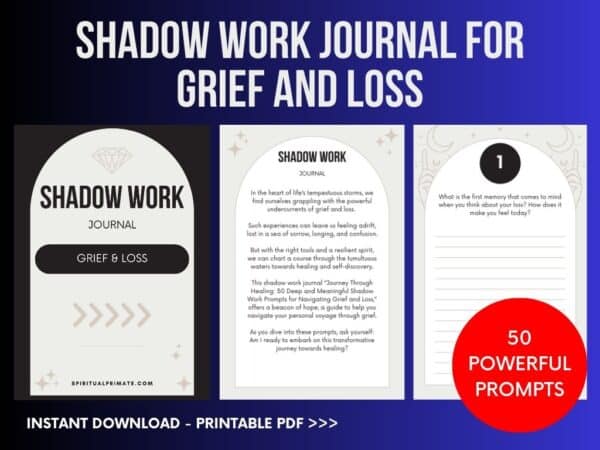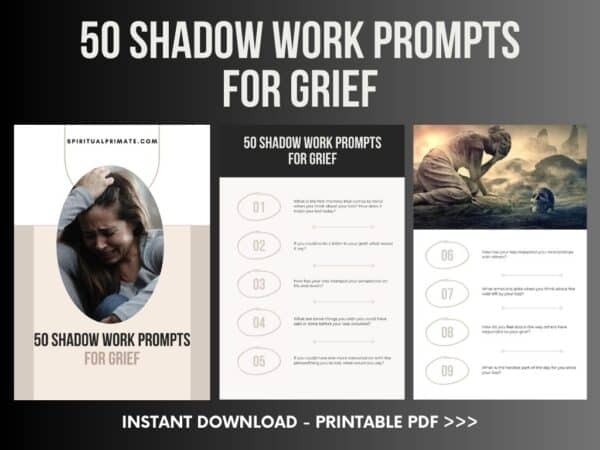In the heart of life’s tempestuous storms, we find ourselves grappling with the powerful undercurrents of grief and loss. Such experiences can leave us feeling adrift, lost in a sea of sorrow, longing, and confusion.
But with the right tools and a resilient spirit, we can chart a course through the tumultuous waters towards healing and self-discovery.
This article, “Journey Through Healing: 50 Deep and Meaningful Shadow Work Prompts for Navigating Grief and Loss,” offers a beacon of hope, a guide to help you navigate your personal voyage through grief.
As you dive into these prompts, ask yourself: Am I ready to embark on this transformative journey towards healing?

Understanding Grief: A Deep Dive into the Emotion of Loss
What is Grief?
Grief is a deeply emotional response to loss, often associated with the death of a loved one, but also triggered by other forms of loss such as the end of a relationship, the loss of a job, or a change in life circumstances. It is a universal experience yet entirely personal, as everyone grieves in their own unique way.
The Many Faces of Grief
Grief can manifest in a multitude of ways. It can be felt as intense sadness, anger, disbelief, or even numbness. Some people may find themselves oscillating between these emotions, while others may experience them simultaneously. The process of grief is not linear; it ebbs and flows, sometimes hitting you unexpectedly.
The Five Stages of Grief
In her seminal work, psychiatrist Elisabeth Kübler-Ross outlined five stages of grief: denial, anger, bargaining, depression, and acceptance. However, these stages are not meant to be a rigid framework but rather a guide to understanding the complex emotions associated with loss.
Grief as a Healing Process
Despite the pain it causes, grief is a necessary part of the healing process. It allows individuals to confront their loss, process their emotions, and eventually, find a way to move forward. Ignoring or suppressing grief can lead to long-term emotional damage.
The Long-Term Impact of Grief
Grief can have a profound impact on an individual’s life. It can affect one’s physical health, mental wellbeing, relationships, and overall quality of life. However, with time, support, and self-care, individuals can learn to live with their loss and continue to find joy and purpose in life.
Grief is a complex and deeply personal process, but understanding it can help those who are grieving to navigate their journey and those around them to provide the support needed. Remember, it’s okay to grieve, and it’s okay to seek help.

Shadow Work: An Ally in Navigating Grief and Loss
Introduction to Shadow Work
Shadow work is a psychological practice that focuses on bringing your subconscious thoughts, feelings, and behaviors into conscious awareness. It operates on the premise that by understanding and accepting these hidden parts of yourself, you can achieve personal growth and healing.
Shadow Work and Grief: Unveiling the Connection
Shadow work can be particularly beneficial when dealing with grief and loss. When you lose a loved one, you’re often left with a myriad of emotions that are difficult to process. Shadow work allows you to confront these emotions, whether it’s anger, guilt, confusion, or despair, and understand their roots.
The Process of Shadow Work in Grief Management
In shadow work, you dive deep into your subconscious and confront the feelings that are often repressed when dealing with grief. This process can be challenging as it requires you to face the depth of your loss and the emotions that come with it. However, it also allows you to release these pent-up emotions and start healing.
The Power of Shadow Work in Healing
Shadow work not only helps you understand your emotions but also allows you to recognize and change the behaviors that may be hindering your healing process. By acknowledging and accepting these aspects of your grief, you create space for self-compassion, forgiveness, and ultimately, healing.
Embracing Shadow Work in Your Healing Journey
Grief and loss are inevitable parts of life. However, the way you navigate these experiences can significantly influence your healing process. By integrating shadow work into your healing journey, you allow yourself to confront and understand your grief, opening the door to authentic healing.

Shadow Work Prompts for Grief
1. What is the first memory that comes to mind when you think about your loss? How does it make you feel today?
2. If you could write a letter to your grief, what would it say?
3. How has your loss changed your perspective on life and death?
4. What are some things you wish you could have said or done before your loss occurred?
5. If you could have one more conversation with the person/thing you’ve lost, what would you say?
6. How has your loss impacted your relationships with others?
7. What emotions arise when you think about the void left by your loss?
8. How do you feel about the way others have responded to your grief?
9. What is the hardest part of the day for you since your loss?
10. Is there a particular season, holiday, or date that triggers your grief more than others?
11. What are some things you do to cope with your grief that you feel aren’t healthy or beneficial?
12. What are some lessons you’ve learned through experiencing your loss?
13. How do you feel when you see others experiencing similar losses?
14. Are there any guilt or regrets associated with your loss? How can you forgive yourself?
15. How has your loss affected your faith or spirituality?
16. If you could ask your grief a question, what would it be?
17. What are some ways you honor the memory of your loss?
18. How has your loss influenced your future plans or goals?
19. What are some fears you have about forgetting aspects of your loss?
20. What are some positive memories you have associated with your loss?
21. How can you incorporate these memories into your healing process?
22. What does healing look like to you in the context of your loss?
23. How does your body physically respond to your grief?
24. What are some unhealthy habits you’ve developed since your loss?
25. How do you feel when you talk about your loss with others?
26. Are there dreams or plans you had that were affected by your loss?
27. What impact has your loss had on your self-identity?
28. How do you envision your life moving forward after your loss?
29. What changes have you noticed in your thought patterns or behaviors since your loss?
30. What role does anger play in your grief process?
31. Has your loss led you to question or re-evaluate your priorities?
32. How have your coping mechanisms evolved over time?
33. What are some ways in which you feel misunderstood in your grief?
34. Do you feel a sense of isolation due to your loss?
35. How can you cultivate compassion for yourself in this grief journey?
36. What are some ways your loss has made you stronger or more resilient?
37. Are there any unresolved issues related to your loss that continue to trouble you?
38. How have your dreams or sleep patterns been affected by your grief?
39. In what ways do you feel your loss has changed you as a person?
40. How do you feel when you encounter reminders of your loss in everyday life?
41. What would it mean to you to find a sense of peace in your grief?
42. How can you use your grief as a tool for growth and self-discovery?
43. Are there any aspects of your loss that you’re avoiding or not fully acknowledging?
44. What are some ways you can express your grief creatively?
45. How does your grief influence your relationship with yourself?
46. What would you say to someone else experiencing a similar loss?
47. If your grief were a physical place, what would it look like?
48. What does acceptance of your loss mean to you?
49. How do you feel when you imagine a future without your loss?
50. What is one thing you wish others understood about your grief and loss?
We have traversed together through the depths of despair, uncovered the hidden fragments of our grief, and sought the light within our darkest shadows. These 50 shadow work prompts are but stepping stones on your path, guiding you towards acceptance and healing.
Each prompt is an invitation to self-reflection, a chance to honor your loss while rekindling your inner strength. As we conclude this journey, remember that grief is not a destination, but a process, a metamorphosis of pain into resilience and growth.
As you continue on your path, ask yourself: How can I use these prompts to further my journey through grief and towards healing?
Dive Deeper Into Your Shadow Work Journey
- Product on sale
 Printable Shadow Work Journal for Grief and Loss [PDF]Original price was: $11.98.$5.99Current price is: $5.99.
Printable Shadow Work Journal for Grief and Loss [PDF]Original price was: $11.98.$5.99Current price is: $5.99. - Product on sale
 50 Shadow Work Prompts for Grief | Printable PDFOriginal price was: $5.98.$2.99Current price is: $2.99.
50 Shadow Work Prompts for Grief | Printable PDFOriginal price was: $5.98.$2.99Current price is: $2.99.

